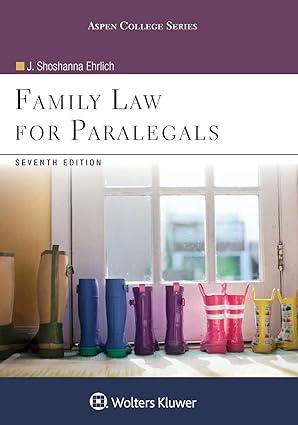Husband's first three issues on appeal address the trial court's determination that Wife is entitled to spousal
Question:
Husband's first three issues on appeal address the trial court's determination that Wife is entitled to spousal support. He asserts that it was error for the trial court to award spousal support in this case because of her voluntary departure from the marital residence, and her exposure of Husband to indignities by going on a cruise with her friends prior to separation and engaging in an extramarital affair post-separation. He also argues that the trial court erred by excluding evidence of Wife's post-separation affair. The law pertaining to spousal support in Pennsylvania is clear: "Married persons are liable for the support of each other according to their respective abilities to provide support as provided by law." \(23 \mathrm{~Pa}\). C.S.A. § 4321(1). A long-recognized exception to the obligation to pay spousal support exists where the recipient spouse conducts him or herself in a manner that would constitute grounds for a fault-based divorce. Initially, we note that all of Husband's arguments regarding Wife's non-entitlement to spousal support are grounds for a fault-based divorce, to wit, indignities and desertion. We begin with Husband's argument that he was subjected to indignities based upon Wife's post-separation extramarital affair. The trial court found that Wife's post-separation conduct was irrelevant for purposes of determining her entitlement to spousal support based upon this Court's decision in Jayne v. Jayne, 443 Pa. Super. 664, 663 A.2d 169 (Pa. Super. 1995), and thus her post-separation relationship with another man was not a basis for denying Wife spousal support. In Jayne, the wife testified that she believed her husband was engaging in an extramarital affair after they separated.... Based on this evidence, the hearing master concluded that the wife had presented sufficient evidence to grant a divorce on the ground of indignities. Because the extramarital affair and protection from abuse proceedings both involved post-separation conduct by the husband, and the record did not support a finding that they shed light upon the behavior of the parties pre-separation, the Jayne Court concluded that the evidence should not have been considered by the hearing master. Id.....
Questions:
1. Why was the husband seeking to show that the wife had engaged in behavior that would entitle him to a fault-divorce?
2. What impact did the wife's post-separation conduct have on the husband's support obligation?
3. Under what circumstance might this conduct have been given more weight by the court?
Step by Step Answer:






